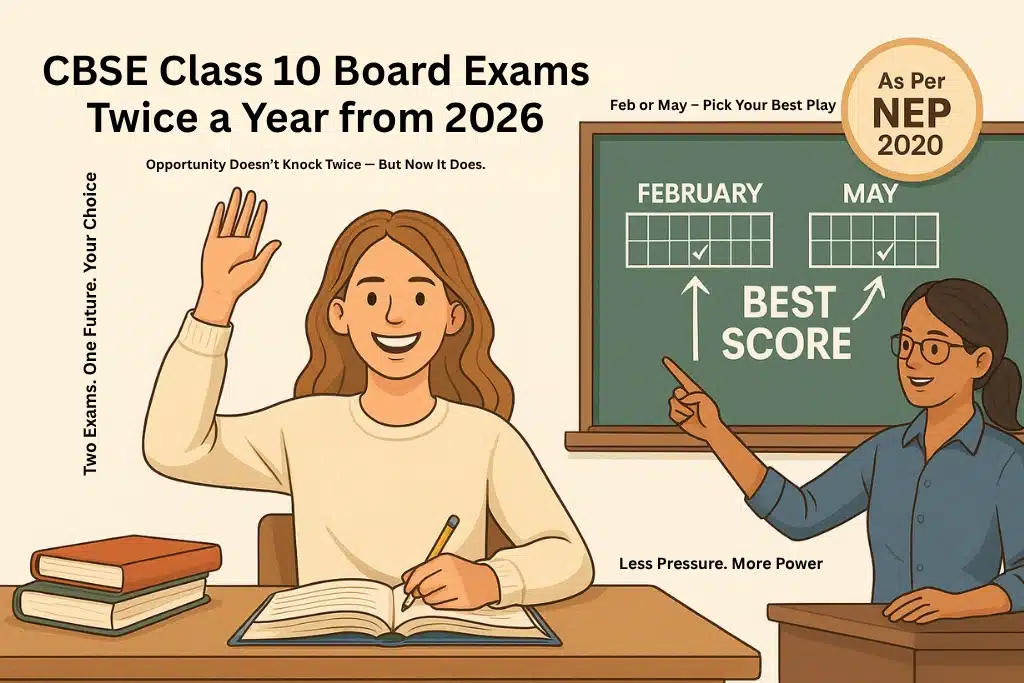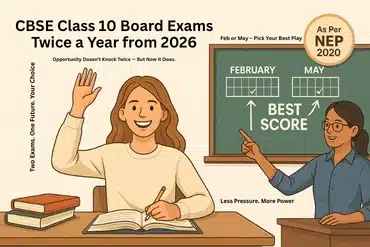CBSE Class 10 Board Exams Twice a Year From 2026


Introduction
CBSE Class 10 Board Exams Twice a Year from 2026 – yes, it’s official. Starting from the 2025–26 academic session, the Central Board of Secondary Education (CBSE) is introducing a major shift that will give Class 10 students not just one, but two chances to appear for their board exams in a single year.
The idea is simple, but powerful: Every student will take their Main Exam in February, and those who wish to improve their scores — or who need to reappear for specific subjects — can opt for a Second Exam in May. It’s a student-first approach, inspired by the National Education Policy (NEP) 2020, which recommends reducing the pressure of “one final exam” by offering more flexibility and opportunities to succeed.
This new system is designed not just to support learning, but to build confidence. Whether you're aiming to improve your marks or just want a backup option, this is a thoughtful move in the right direction.
Key Changes & Rationale (NEP-2020 Guidance)
National Education Policy (NEP-2020) -
National Education Policy (NEP-2020) encourages giving students two exam attempts per year to “eliminate the high-stakes aspect of Board Exams”.
Who Benefits?
This change is meant to benefit students by offering flexibility. For example, a student not happy with the first result can improve scores in the second exam. It also allows best-of-two scoring and helps students in unavoidable circumstances (illness, events) not lose an entire year.
General Rules for CBSE Two-Exam System
| Rule | Explanation |
|---|---|
| Mandatory Main Exam | Every student must appear in the February (main) exam. It is compulsory and covers the full syllabus. |
| Improvement Opportunity | Students who pass in Feb can reappear in up to 3 subjects (from Science, Math, Social Science, or Languages) in May to improve their scores. |
| Skips & Essential Repeat | If a student misses 3 or more subjects in Feb, they become an Essential Repeat and must reappear next year. May exam is not allowed in this case. |
| Compartment Cases | Students who fail in 1–2 subjects (but pass others) are marked as Compartment. They can reappear in those subjects in May. |
| No New Subjects Allowed | Students cannot add new or stand-alone subjects after passing Class 10. May exam must include only previously registered subjects. |
| Internal Assessment | Project, practical, and internal marks are taken only once before the February exam. These marks apply to both Feb and May attempts. |
| Full Syllabus in Both Exams | Both exams follow the complete syllabus. No partial syllabus in May exam. Study plan remains the same for both. |
Summary:
|
|
Special Provisions for Specific Student Categories
Sports Students
Students participating in major sports events that clash with exam dates are allowed to appear in the second (May) exam for only the subjects affected. This prevents academic loss due to national-level sports commitments.
Winter-Bound Schools
Students from snow-bound or remote areas may choose to appear in the first or second exam for individual subjects. This flexibility helps manage difficulties arising from winter disruptions in their region.
CWSN (Children With Special Needs)
All facilities such as extra time, scribes, assistive tools, and accommodations given during the February exam will also be provided during the May exam. CWSN students receive equal support in both attempts.
Exam Dates & Schedule
The two exams follow the normal CBSE calendar, adjusted for a second round:
- Main Exam (First): Starts in mid-February (as usual). Schools will schedule board papers for all students in this period.
- Result (First Exam): Declared in April. Students get their results before summer break.
- Second Exam (Improvement): Held in May, after the first exam. This is for eligible students to retake papers.
- Result (Second Exam): Declared in June, usually before the start of the new academic year.
Timeline Comparison Table
| Exam | When | Result Declared | Who Can Appear / Purpose |
|---|---|---|---|
| Main (First) | Mid-February (full syllabus) |
April (as per exam bye-laws) |
All Class X students (freshers, repeaters, improvement, compartments) |
| Improvement (Second) | May (full syllabus) |
June (after re-exams) |
Eligible students improving up to 3 subjects, and compartment students (see rules) |
Enrollment (LOC) & Admissions
📋 LOC Submission (Main Exam)
Schools must submit a List of Candidates (LOC) for the February exam, listing each student and their subjects. This is the primary enrollment form required for every Class X student.
🗂️ LOC Submission (Second Exam)
A fresh LOC is filed for the May improvement exam. It includes only those students who were already registered for the main exam. No new names or subjects can be added at this stage.
🔄 Subject Changes
Subject switching is not allowed between exams. Students must stick with the subjects listed in the February LOC. CBSE allows changes only in rare, approved cases.
🎓 Class XI Admission
Students who fail in February can take provisional admission in Class XI. Their promotion becomes final if they clear the second exam in May. Final certificates are issued only after both exams are completed.
Results & Post-Exam Facilities
📂 DigiLocker
After the February board exam, student marks are uploaded to DigiLocker. These results can be used for admissions if the student chooses not to appear in the improvement exam. If a student opts for the May exam, the latest score will be considered for final use in admissions and certificates.
🎓 Passing Certificates
The official pass certificates, as well as any merit or rank certificates, are only issued after the May improvement exam. This allows CBSE to include the best score from either attempt in the student’s final academic record.
🔍 Photocopy & Re-evaluation
Students can apply for photocopying, verification, or re-evaluation of their answer sheets only after the second exam’s results are declared. Both February and May papers are reviewed together during this post-result phase.
Guidance for Schools, Students & Parents
Step 1: Informing Stakeholders
Schools must clearly communicate the two-exam policy to all students and parents. CBSE emphasizes the need to orient everyone about the changes and timelines.
Step 2: Accurate Data Collection
When filling the LOC forms, schools must ensure student data and subjects are accurate. Mistakes here can affect eligibility and result processing.
step 3: Timely Completion
Registration, payments, and formalities for both February and May exams must be completed before deadlines. Coordination is key among school, parents, and students.
Step 4: Clarify Doubts
Teachers and administrators must clear up any confusion around terms like “Essential Repeat” or “Compartment” so no student is misled or misses deadlines.
Comparison Table: Old vs. New Class 10 Exam System
| Feature | Old System (Till 2025) | New System (From 2026) |
|---|---|---|
| Exam Sessions/Year | Main Exam (Feb/Mar) + optional Supplementary (July) | Two official exams: First (Feb), Second (May) |
| Mandatory vs. Optional | Main Exam mandatory; Supplementary optional | First mandatory; Second optional (improvement) |
| Subjects Improved | Up to 2 subjects in Supplementary | Up to 3 subjects in Improvement (May) |
| Score Policy | Supplementary replaces previous if better | Only better score (Feb or May) is counted |
| Exam Schedule | Main: Feb, Supplementary: July, Result: Aug/Sep | Main: Feb, Improvement: May, Result: Apr & Jun |
| Syllabus & Pattern | Full-year syllabus; same pattern | Full-year syllabus; same pattern |
| Internal Assessment | Once with Main Exam | Once before First Exam |
| Compartment/Repeat | Fail ≥2 = July; more = repeat year | Fail/skip ≥3 = Repeat; up to 2 = May attempt |
| Assessment Timing | Before Main Exam | Before First Exam (Feb) |
| Results & Admission | Final after all exams; certificate after July | Feb result for provisional; June final |
| Special Categories | No provisions for sports/winter/CWSN | Provisions for sports/winter-bound & CWSN students |
📄 Official CBSE Circular (2025–26)
CBSE has officially released the full PDF circular for the new exam system starting 2026. This includes all eligibility rules, exam schedules, guidelines, and key instructions.
Stay informed and download it now.
📌 Summary of Benefits
📈 Second Chance to Improve
Students now get the opportunity to improve scores in up to 3 subjects, offering a direct way to boost their overall grades and academic confidence. This second exam truly acts as a safety net.
😌 Reduced Pressure, Better Learning
The new structure reduces exam stress by giving every student a fallback option. This helps learners focus on understanding the subject rather than cramming, directly supporting the vision of NEP 2020.
🔓 Flexible Entry for Everyone
Whether you're a fresh Class 10 student, repeating a subject, or aiming to improve – the February exam is open to all, while the May exam is optional and eligibility-based. You’re always in control.
⚖️ Consistent and Fair
No tricks. Both exam attempts follow the same syllabus, same paper pattern, and same preparation model – ensuring transparency and fairness for all students.
📚 Smooth Admission to Class XI
With DigiLocker records and provisional Class XI admissions, students don’t face unnecessary delays – even if they need the May attempt. Final certificates reflect your best performance automatically.
Final Word: The CBSE Class 10 Two-Board Exam Policy (effective from 2026) is a bold, student-first reform. It provides flexibility, fairness, and peace of mind to students while keeping education standards high. Whether you're a parent, teacher, or student – understanding this new structure ensures you're fully prepared to take advantage of every opportunity it offers.
📘 Future Plans: Class 12 May Get Same Flexibility
While the two-exam system is currently confirmed for Class 10 from 2026 onwards, CBSE has hinted that a similar policy could be considered for Class 12 in the future. This would allow senior students the same opportunity to improve scores, reduce pressure, and move toward more flexible academic planning — in line with the vision of NEP 2020.
📝 Internal Assessments: Conducted Only Once
According to CBSE guidelines, internal assessments (projects, activities, practicals, etc.) will be conducted only once — before the first exam in February. This assessment will apply to both exam phases. Students do not need to repeat internal work for the second (May) exam, which makes the process more efficient and stress-free.
One of the best blog I have read ever , thanks for sharing the information regarding cbse class 10 board exam .
It’s so confusing to understand it , but after reading this blog I understand everything.